Vineel Pratap
Omnilingual ASR: Open-Source Multilingual Speech Recognition for 1600+ Languages
Nov 12, 2025



Abstract:Automatic speech recognition (ASR) has advanced in high-resource languages, but most of the world's 7,000+ languages remain unsupported, leaving thousands of long-tail languages behind. Expanding ASR coverage has been costly and limited by architectures that restrict language support, making extension inaccessible to most--all while entangled with ethical concerns when pursued without community collaboration. To transcend these limitations, we introduce Omnilingual ASR, the first large-scale ASR system designed for extensibility. Omnilingual ASR enables communities to introduce unserved languages with only a handful of data samples. It scales self-supervised pre-training to 7B parameters to learn robust speech representations and introduces an encoder-decoder architecture designed for zero-shot generalization, leveraging a LLM-inspired decoder. This capability is grounded in a massive and diverse training corpus; by combining breadth of coverage with linguistic variety, the model learns representations robust enough to adapt to unseen languages. Incorporating public resources with community-sourced recordings gathered through compensated local partnerships, Omnilingual ASR expands coverage to over 1,600 languages, the largest such effort to date--including over 500 never before served by ASR. Automatic evaluations show substantial gains over prior systems, especially in low-resource conditions, and strong generalization. We release Omnilingual ASR as a family of models, from 300M variants for low-power devices to 7B for maximum accuracy. We reflect on the ethical considerations shaping this design and conclude by discussing its societal impact. In particular, we highlight how open-sourcing models and tools can lower barriers for researchers and communities, inviting new forms of participation. Open-source artifacts are available at https://github.com/facebookresearch/omnilingual-asr.
Effects of Speaker Count, Duration, and Accent Diversity on Zero-Shot Accent Robustness in Low-Resource ASR
Jun 04, 2025Abstract:To build an automatic speech recognition (ASR) system that can serve everyone in the world, the ASR needs to be robust to a wide range of accents including unseen accents. We systematically study how three different variables in training data -- the number of speakers, the audio duration per each individual speaker, and the diversity of accents -- affect ASR robustness towards unseen accents in a low-resource training regime. We observe that for a fixed number of ASR training hours, it is more beneficial to increase the number of speakers (which means each speaker contributes less) than the number of hours contributed per speaker. We also observe that more speakers enables ASR performance gains from scaling number of hours. Surprisingly, we observe minimal benefits to prioritizing speakers with different accents when the number of speakers is controlled. Our work suggests that practitioners should prioritize increasing the speaker count in ASR training data composition for new languages.
Improving Multilingual ASR in the Wild Using Simple N-best Re-ranking
Sep 27, 2024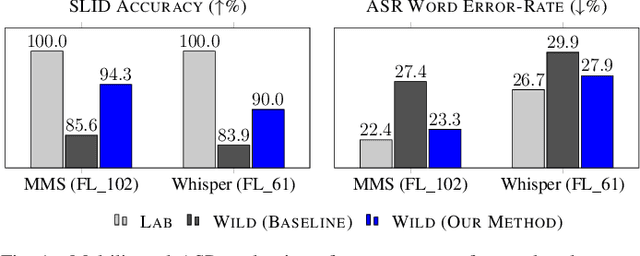
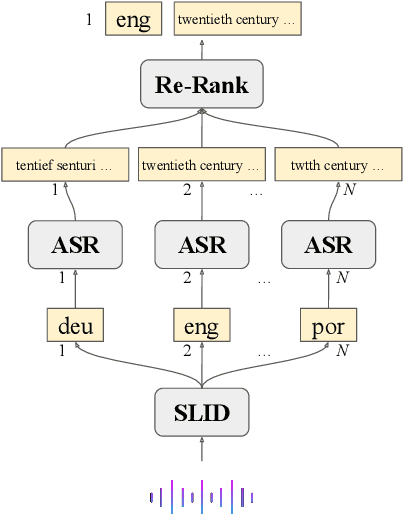
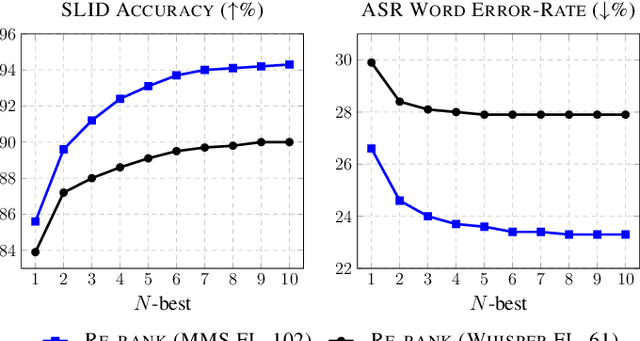

Abstract:Multilingual Automatic Speech Recognition (ASR) models are typically evaluated in a setting where the ground-truth language of the speech utterance is known, however, this is often not the case for most practical settings. Automatic Spoken Language Identification (SLID) models are not perfect and misclassifications have a substantial impact on the final ASR accuracy. In this paper, we present a simple and effective N-best re-ranking approach to improve multilingual ASR accuracy for several prominent acoustic models by employing external features such as language models and text-based language identification models. Our results on FLEURS using the MMS and Whisper models show spoken language identification accuracy improvements of 8.7% and 6.1%, respectively and word error rates which are 3.3% and 2.0% lower on these benchmarks.
Scaling A Simple Approach to Zero-Shot Speech Recognition
Jul 25, 2024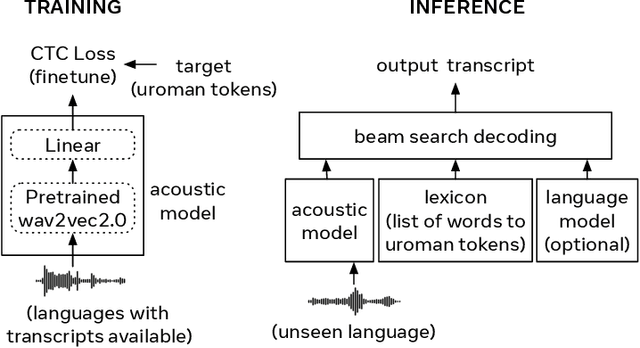


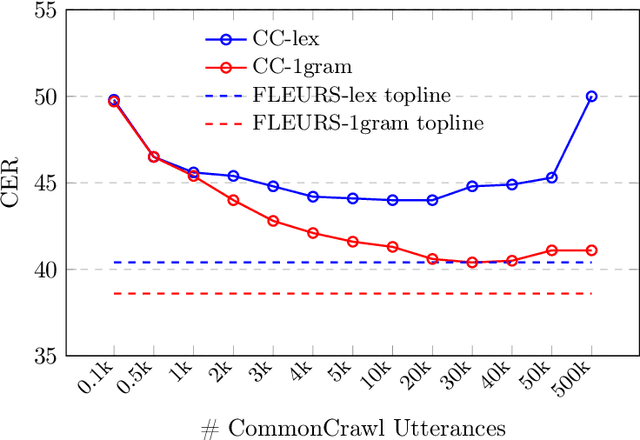
Abstract:Despite rapid progress in increasing the language coverage of automatic speech recognition, the field is still far from covering all languages with a known writing script. Recent work showed promising results with a zero-shot approach requiring only a small amount of text data, however, accuracy heavily depends on the quality of the used phonemizer which is often weak for unseen languages. In this paper, we present MMS Zero-shot a conceptually simpler approach based on romanization and an acoustic model trained on data in 1,078 different languages or three orders of magnitude more than prior art. MMS Zero-shot reduces the average character error rate by a relative 46% over 100 unseen languages compared to the best previous work. Moreover, the error rate of our approach is only 2.5x higher compared to in-domain supervised baselines, while our approach uses no labeled data for the evaluation languages at all.
TorchAudio 2.1: Advancing speech recognition, self-supervised learning, and audio processing components for PyTorch
Oct 27, 2023
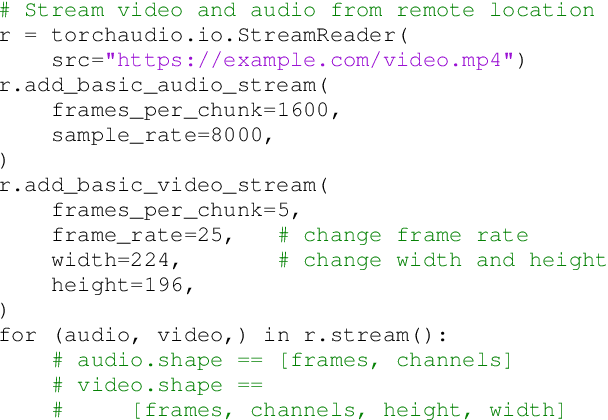

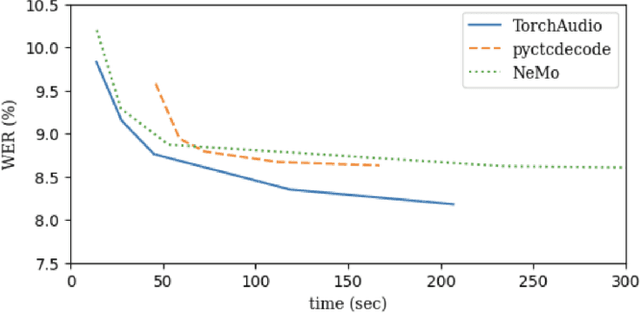
Abstract:TorchAudio is an open-source audio and speech processing library built for PyTorch. It aims to accelerate the research and development of audio and speech technologies by providing well-designed, easy-to-use, and performant PyTorch components. Its contributors routinely engage with users to understand their needs and fulfill them by developing impactful features. Here, we survey TorchAudio's development principles and contents and highlight key features we include in its latest version (2.1): self-supervised learning pre-trained pipelines and training recipes, high-performance CTC decoders, speech recognition models and training recipes, advanced media I/O capabilities, and tools for performing forced alignment, multi-channel speech enhancement, and reference-less speech assessment. For a selection of these features, through empirical studies, we demonstrate their efficacy and show that they achieve competitive or state-of-the-art performance.
Scaling Speech Technology to 1,000+ Languages
May 22, 2023Abstract:Expanding the language coverage of speech technology has the potential to improve access to information for many more people. However, current speech technology is restricted to about one hundred languages which is a small fraction of the over 7,000 languages spoken around the world. The Massively Multilingual Speech (MMS) project increases the number of supported languages by 10-40x, depending on the task. The main ingredients are a new dataset based on readings of publicly available religious texts and effectively leveraging self-supervised learning. We built pre-trained wav2vec 2.0 models covering 1,406 languages, a single multilingual automatic speech recognition model for 1,107 languages, speech synthesis models for the same number of languages, as well as a language identification model for 4,017 languages. Experiments show that our multilingual speech recognition model more than halves the word error rate of Whisper on 54 languages of the FLEURS benchmark while being trained on a small fraction of the labeled data.
Flashlight: Enabling Innovation in Tools for Machine Learning
Jan 29, 2022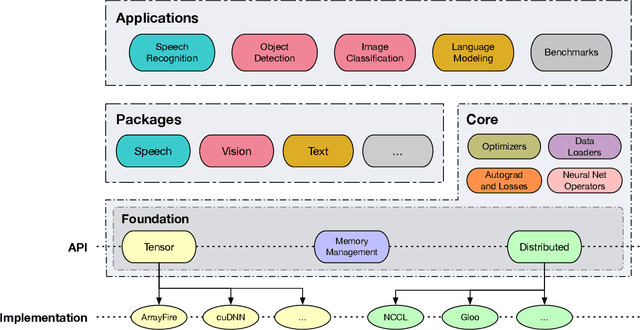

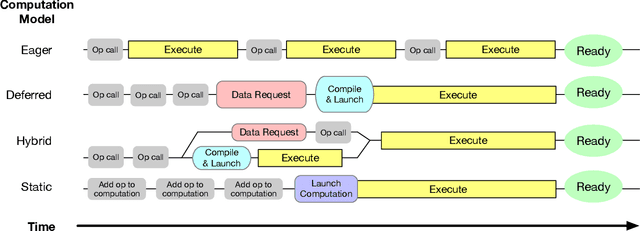

Abstract:As the computational requirements for machine learning systems and the size and complexity of machine learning frameworks increases, essential framework innovation has become challenging. While computational needs have driven recent compiler, networking, and hardware advancements, utilization of those advancements by machine learning tools is occurring at a slower pace. This is in part due to the difficulties involved in prototyping new computational paradigms with existing frameworks. Large frameworks prioritize machine learning researchers and practitioners as end users and pay comparatively little attention to systems researchers who can push frameworks forward -- we argue that both are equally important stakeholders. We introduce Flashlight, an open-source library built to spur innovation in machine learning tools and systems by prioritizing open, modular, customizable internals and state-of-the-art, research-ready models and training setups across a variety of domains. Flashlight allows systems researchers to rapidly prototype and experiment with novel ideas in machine learning computation and has low overhead, competing with and often outperforming other popular machine learning frameworks. We see Flashlight as a tool enabling research that can benefit widely used libraries downstream and bring machine learning and systems researchers closer together.
Star Temporal Classification: Sequence Classification with Partially Labeled Data
Jan 28, 2022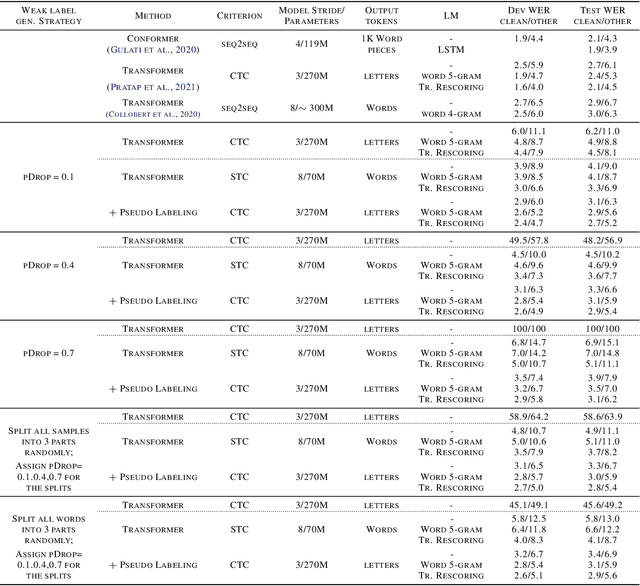
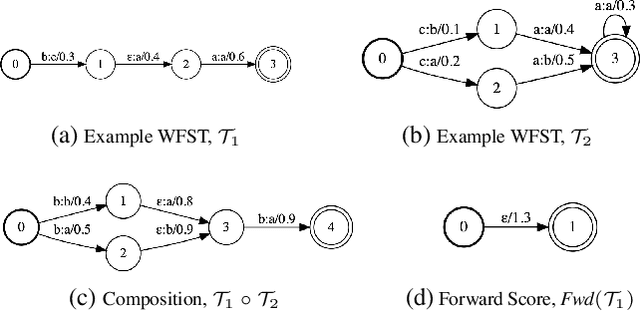
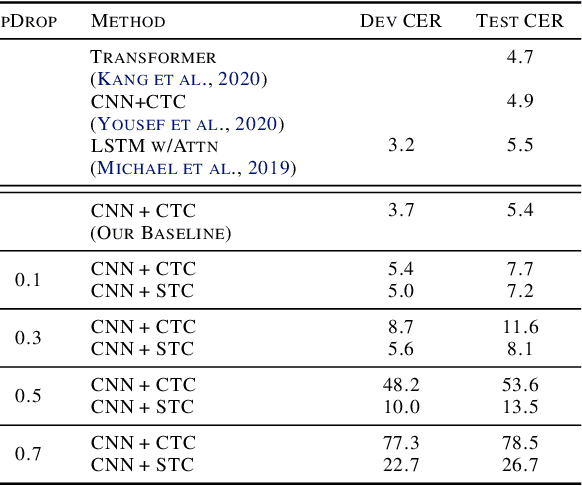
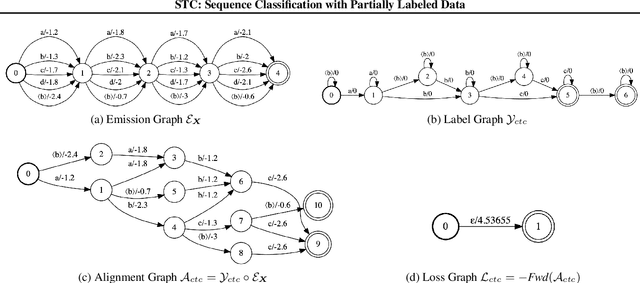
Abstract:We develop an algorithm which can learn from partially labeled and unsegmented sequential data. Most sequential loss functions, such as Connectionist Temporal Classification (CTC), break down when many labels are missing. We address this problem with Star Temporal Classification (STC) which uses a special star token to allow alignments which include all possible tokens whenever a token could be missing. We express STC as the composition of weighted finite-state transducers (WFSTs) and use GTN (a framework for automatic differentiation with WFSTs) to compute gradients. We perform extensive experiments on automatic speech recognition. These experiments show that STC can recover most of the performance of supervised baseline when up to 70% of the labels are missing. We also perform experiments in handwriting recognition to show that our method easily applies to other sequence classification tasks.
Word Order Does Not Matter For Speech Recognition
Oct 18, 2021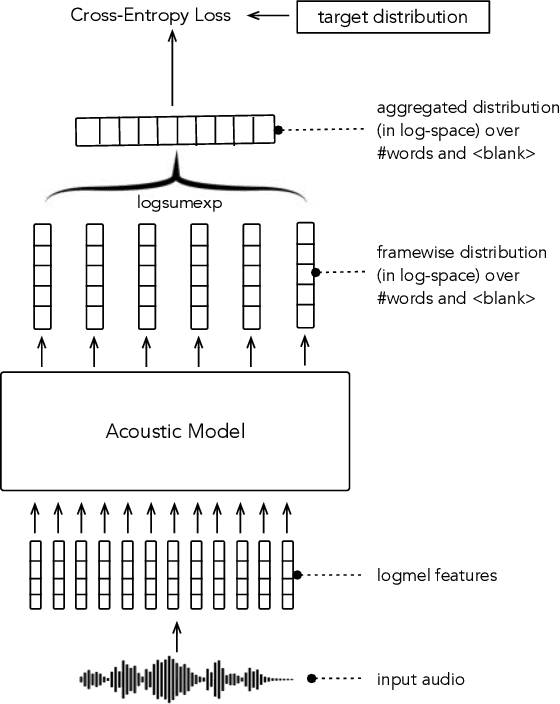
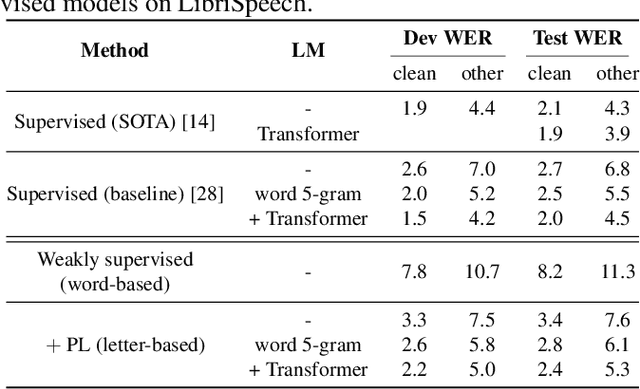
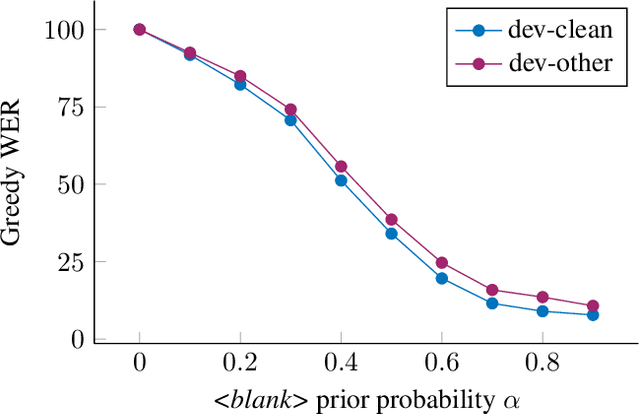

Abstract:In this paper, we study training of automatic speech recognition system in a weakly supervised setting where the order of words in transcript labels of the audio training data is not known. We train a word-level acoustic model which aggregates the distribution of all output frames using LogSumExp operation and uses a cross-entropy loss to match with the ground-truth words distribution. Using the pseudo-labels generated from this model on the training set, we then train a letter-based acoustic model using Connectionist Temporal Classification loss. Our system achieves 2.3%/4.6% on test-clean/test-other subsets of LibriSpeech, which closely matches with the supervised baseline's performance.
Parallel Composition of Weighted Finite-State Transducers
Oct 06, 2021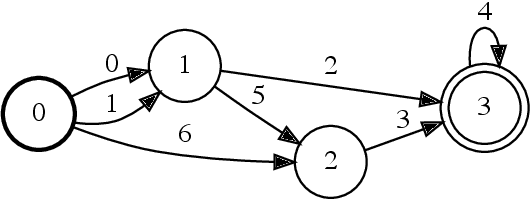



Abstract:Finite-state transducers (FSTs) are frequently used in speech recognition. Transducer composition is an essential operation for combining different sources of information at different granularities. However, composition is also one of the more computationally expensive operations. Due to the heterogeneous structure of FSTs, parallel algorithms for composition are suboptimal in efficiency, generality, or both. We propose an algorithm for parallel composition and implement it on graphics processing units. We benchmark our parallel algorithm on the composition of random graphs and the composition of graphs commonly used in speech recognition. The parallel composition scales better with the size of the input graphs and for large graphs can be as much as 10 to 30 times faster than a sequential CPU algorithm.
 Add to Chrome
Add to Chrome Add to Firefox
Add to Firefox Add to Edge
Add to Edge